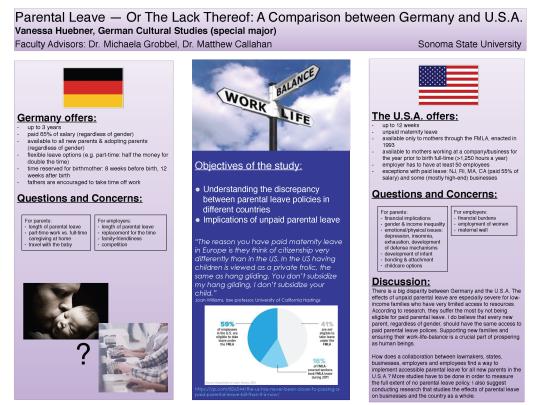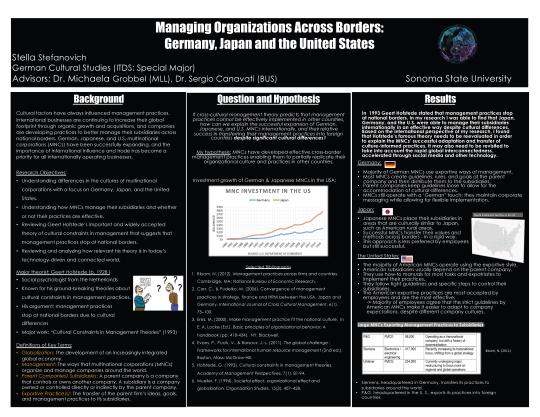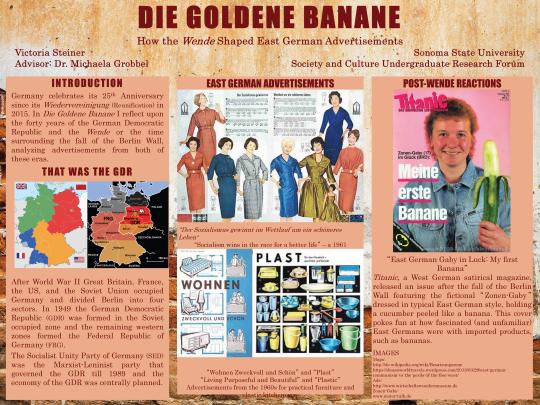Student Creative & Research Projects
Sample of final project in GER 210 (Intermediate German through Film):
"Dinge aufschieben" (Procrastination)
https://www.youtube.com/watch?v=OLXzHu7Ndjs
Samples of final research presentations by special major students in German Cultural Studies:
Max Nizetich, Britain, the United States, and West Germany: Decades of Cultural Exchange and Musical Evolution
https://orsp.sonoma.edu/training-and-events/gallery/britain-united-states-and-west-germany
Abstract:
By the mid to late 1970s, West Germany participated in a cyclical exchange of culture when its music reached Anglo-American artists such as David Bowie and Joy Division/ New Order. This cultural exchange allowed musicians to push the boundaries of what popular music can sound like. Cultural imperialism that dominated West Germany after World War II divided the German population. German radio stations, movie theatres, and bookstores were filled with Anglo-American works. Anglo-American culture fascinated the German youth, who were trying to distance themselves from their parents. This cultural difference led to the generational conflict with the older culturally conservative parents against the radical liberal youth. Cultural imperialism, however, also led to the emergence of an avant-garde musical movement known as Krautrock.
Kraftwerk, NEU!, Amon Duul II, and Tangerine Dream avoided the mainstream up-beat rock n roll, beat music, and German Schlager. They aimed at expanding the forms of composition and production of psychedelic rock and avant-garde composers like Stockhausen, Pink Floyd, and The Who. Bands associated with Krautrock pushed the boundaries of what could be done with synthesizers, motorik drum beats, electronic equipment, and computers. Their decision to take a more avant-garde approach by adopting synthesizers, computers and long segments of improvisation reached Anglo-American Artists like David Bowie and Joy Division/ New Order. These artists who were exposed to this new German music and culture were influenced by Krautrock bands to reinvent themselves and their music. By the early 1980s, synth-pop, post-punk, and electronic dance music emerged as mainstream genres. The result of this cultural exchange between England, the United States, and West Germany led to the emergence of Krautrock, which in turn played a role in how modern music would splinter into various genres during the latter half of the twentieth century in the USA and England.
Piper Rosier, Unified in a Shadow Dream: Germany at the Crossroads and in the Crosshairs of Globalized Capitalism
https://orsp.sonoma.edu/training-and-events/gallery/shadow-dream-unification-after-fall-berlin-wall
Abstract:
On November 9, 1989, a wave of excitement overtook many East Germans released from their cage behind the Berlin wall. Possibilities were in the air. Was this a chance for the real democratic socialist state that so many in the east desired? Could East Germany keep a sense of community and supportive infrastructure, but now have a chance to liberate silenced voices? Would they pursue equality and harmony with nature, with the bonus of access to western markets, and the world? In my final project I look at feminist, socialist and environmental activists, whose writings carried a hope for these dreams of the best of both worlds to materialize: a rising to the top of what had been on the bottom, as Christa Wolf said in a rousing speech. But in the upheaval to come, in the Shock Therapy bonanza of both privatization and austerity measures brought to bear, realization settled painfully. East Germany would be the latest conquest of capitalist globalization. East German culture would be rapidly transformed, with feminists, socialists, and anti-imperialists left aside in the shadows, holding to their dreams. Nevertheless these thinkers and dreamers continued to be a shining light in the war of ideas, reminding everyone of what has passed and what still can be.
Hannah Lodge, The German School System: Inaccessibility - Is Gesamtschule the Best Option?
Abstract:
This project investigates whether or not the current tiered school system disadvantages students in Germany of a minority background (minority meaning: one who belongs to an ethnic, cultural, socio-economic minority, or one who is disabled physically or mentally. My findings show that Germany’s public school system has been systemically failing to provide equal opportunities in education for a large percentage of students on the basis of income, ethnicity, and minority status. I conclude with the suggestion that a comprehensive school model similar to Gesamtschule, along with the elimination of Sonderschule and Förderschule, would greatly be of benefit to all students in Germany.
Vanessa Hübner, "Parental Leave — Or The Lack Thereof: A Comparison between Germany and U.S.A."

Stella Stefanovich, "Managing Organizations Across Borders: Germany, Japan, and the United States"

Wiley Winheim, "Foreign Language Education in Germany & the U.S."

Sandra Arjona, "Tübingen: From Breeding Ground of Nazi Ideology to a Place of Refuge"

Sandra's work earned her the "Outstanding Poster Presentation"-Award at the 2016 SSU Symposium for Research and Creativity

Victoria Steiner, "Die goldene Banane: How the Wende Shaped East German Advertisements"


